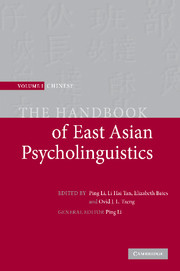Book contents
- Frontmatter
- Contents
- List of figures
- Notes on contributors
- Preface
- Introduction: new frontiers in Chinese psycholinguistics
- Part I Language acquisition
- Part II Language processing
- 14 Word-form encoding in Chinese speech production
- 15 Effects of semantic radical consistency and combinability on Chinese character processing
- 16 Eye movement in Chinese reading: basic processes and crosslinguistic differences
- 17 The Chinese character in psycholinguistic research: form, structure, and the reader
- 18 Perception and production of Mandarin Chinese tones
- 19 Phonological mediation in visual word recognition in English and Chinese
- 20 Reading Chinese characters: orthography, phonology, meaning, and the Lexical Constituency Model
- 21 Processing of characters by native Chinese readers
- 22 L2 acquisition and processing of Mandarin tones
- 23 The comprehension of coreference in Chinese discourse
- 24 Lexical ambiguity resolution in Chinese sentence processing
- Part III Language and the brain
- Epilogue: a tribute to Elizabeth Bates
- References
- Name index
- Subject index
23 - The comprehension of coreference in Chinese discourse
Published online by Cambridge University Press: 05 June 2012
- Frontmatter
- Contents
- List of figures
- Notes on contributors
- Preface
- Introduction: new frontiers in Chinese psycholinguistics
- Part I Language acquisition
- Part II Language processing
- 14 Word-form encoding in Chinese speech production
- 15 Effects of semantic radical consistency and combinability on Chinese character processing
- 16 Eye movement in Chinese reading: basic processes and crosslinguistic differences
- 17 The Chinese character in psycholinguistic research: form, structure, and the reader
- 18 Perception and production of Mandarin Chinese tones
- 19 Phonological mediation in visual word recognition in English and Chinese
- 20 Reading Chinese characters: orthography, phonology, meaning, and the Lexical Constituency Model
- 21 Processing of characters by native Chinese readers
- 22 L2 acquisition and processing of Mandarin tones
- 23 The comprehension of coreference in Chinese discourse
- 24 Lexical ambiguity resolution in Chinese sentence processing
- Part III Language and the brain
- Epilogue: a tribute to Elizabeth Bates
- References
- Name index
- Subject index
Summary
Most psycholinguistic research on Chinese has examined processing at the level of the word. The dramatic differences between languages like English, that have orthographic writing systems, and languages like Chinese, that have ideographic writing systems, have made the study of the recognition of Chinese words a fascinating and fruitful area for understanding the cognitive mechanisms involved in a variety of aspects of lexical processing. In contrast, relatively little psycholinguistic research has systematically examined higher levels of processing, such as discourse integration, for Chinese (Cheng, 1987). While not as immediately apparent as the differences in writing systems, there do appear to be important differences at the discourse level between Chinese and English. Linguistic analyses of Chinese are divided over whether comprehension is guided principally by contextual and pragmatic information (e.g. Chu, 1998; Li & Thompson, 1981; Tsao, 1977) or instead is more responsive to the structural organization of an utterance (e.g. Huang, 1982; Aoun & Li, 1992), as has often been suggested in comprehension studies of English. Theoretical attempts in psycholinguistics to understand discourse processing have shown that referential expressions – words or phrases that refer to people, things or events – play a fundamental role in making discourse coherent, but that conclusion has been primarily based on studies of English (e.g. Garrod & Sanford, 1982; Kintsch & van Dijk, 1978; Gordon & Hendrick, 1998).
- Type
- Chapter
- Information
- The Handbook of East Asian Psycholinguistics , pp. 257 - 267Publisher: Cambridge University PressPrint publication year: 2006



